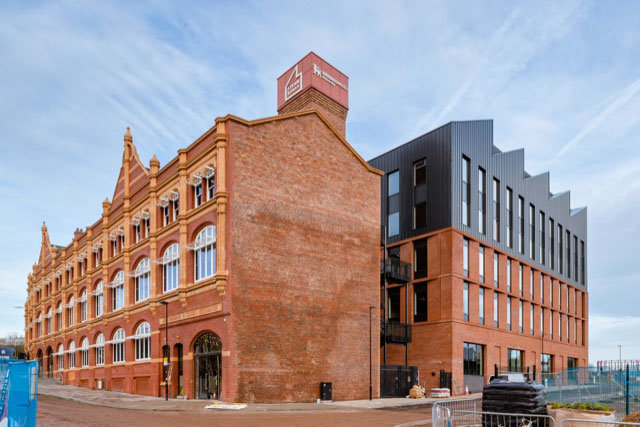Investor in Innovation
STEAMhouse: Forging a generative innovation ecosystem
Being part of an innovation ecosystem can help businesses and entrepreneurs to launch and develop solutions to real-life problems in a timely and efficient way, but too few organisations are embracing it, writes Joanna Birch, Director of Birmingham City University’s Innovation, Enterprise and Employability directorate.
What is an innovation ecosystem?
An ecosystem is a network of companies and other entities, brought together by a shared set of technologies, knowledge and skills.
This ecosystem should work cooperatively to develop new products and services. Often, an innovation ecosystem includes a broad range of stakeholders from various industries – universities, government representatives, entrepreneurs, mentors and the media.
An ecosystem approach to innovation, which leverages talent both inside and outside of your organisation, is a highly desirable and successful way of responding to a competitive, ever-changing environment.
Being part of an ecosystem has yielded many benefits for businesses, with a recent survey from EY.com revealing that 91 percent of organisations feel that ecosystems have increased the resilience of their business.
Business leaders believe their future success will rely heavily on being part of an industry that has an ecosystem.
Furthermore, research from global market intelligence firm IDC tells us that business leaders believe their future success will rely heavily on being part of an industry that has an ecosystem. This research also reports that industry ecosystems can yield a 40 percent greater innovation rate than conventional methodologies.
However, many businesses have still yet to reach out and fully utilise these ecosystems, or indeed look to create one of their own. Competitive pressure to innovative is continuously driving companies to seek new ideas, but many are failing to tap into innovation ecosystems in their own regions.
Corporate leaders often spread their efforts too thinly, engaging in a flurry of superficial activities that do not yield real results.
The importance of having an efficient innovation ecosystem
A successful innovation ecosystem isn’t just about success in terms of outcomes. It is also about working practices. Investing in the ecosystem, helping inform the way it works and actively contributing is the best way of engineering great outcomes.
If you visit the London area of Shoreditch, for example, you will find a cluster of likeminded individuals challenging established industries, working in an ecosystem that has access to talent, money and community, a prime example being Huckletree.
With everyone understanding that both the outcomes and working practices are of value, you build the actors, relationships and resources needed to work together to bring a great idea to life.
Efficient ecosystems deliver relationships and transparency and show to potential members the way that community works and that the results it delivers are attractive, and to stakeholders that the outcomes and critical mass of individuals is worthy of investment and engagement.
With everyone understanding that both the outcomes and working practices are of value, you build the actors, relationships and resources needed to work together to bring a great idea to life.
While I believe that innovation can be achieved any way, I also feel that to take innovation and drive it to a transformative scale, it is critical to have access to skills, resources and stakeholders.
What principles are key to an efficient ecosystem?
For ecosystems to be effective, connectivity is central. Access to good skills, network and intelligence critical. Good relationships and transparency are key.
When we developed STEAMhouse – our innovation centre that provides support to makers, creatives, entrepreneurs and businesses in the Birmingham region – we visited a number of other established ecosystems, including Waterloo and Kitchener in Canada.
We look to deliver a supportive, effective ecosystem that brought together relationships that drive access to skills, knowhow and technical guidance, reducing barriers and facilitating progress.
In talking to the founders, businesses, councils, government investment teams and incredible tech businesses, it was really clear how they used place, relationships and resources to great effect combining mentorship, networks, skills support and talent development. Where these worked best the ecosystem connects seamlessly.
We combined this with our STEAMhouse principles – collaboration, conversation, exploration, openness and newness – to look to deliver a supportive, effective ecosystem that brought together relationships that drive access to skills, knowhow and technical guidance, reducing barriers and facilitating progress.

Positive transformation
Birmingham has become a mega city – it is well serviced by a good and efficient local transport system, with most suburbs within 30 minutes from the City Centre. It is one of the most diverse cities in the UK and new regeneration projects – such as the £700 million Paradise project, which will create a thriving hub of events, spaces, squares, restaurants and more – are only adding to its appeal.
As part of our local ecosystem we have been thinking about our role in supporting innovation and business growth using the knowledge and infrastructure that we now have.
Birmingham has been crowned the UK’s regional startup capital for the past seven years running. The Covid-19 pandemic did nothing to dampen this – in fact, there was rapid growth, with a 48 percent uplift in business formation during the latter period of 2020 and early part of 2021. It should come as no surprise, what with Birmingham being the birthplace of industry and frequently sparking new ideas. We believe this is a great opportunity to inspire a future community to support innovation as many new startups, sadly, fail, with 70 percent closing between years two and five.
Our online business portal, BCU Advantage, assists businesses in Birmingham of all sizes to start, grow and innovate through a broad range of products and services.
As we strive to be the University for Birmingham, we take very seriously the success of our city and the wider region. We partner with all key stakeholders from the Greater Birmingham and Solihull Local Enterprise Partnership Growth Hub, the Greater Birmingham Chamber of Commerce, local authorities and other growth supportive networks.
We’ve been reviewing how to utilise our growing infrastructure to support transformation. Our online business portal, BCU Advantage, assists businesses in Birmingham of all sizes to start, grow and innovate through a broad range of products and services.
The space offers designated incubation space, business accelerator, co-working and fully equipped production spaces and a challenge lab.

During the pandemic, we showcased how innovation can be born out of disruption and uncertainty. For example, during the Covid-induced lockdown, our STEAM team were able to support 475 members remotely to build ideas from paper to prototype. This included:
- An online learning platform, enabling members to produce new prototypes via online meetings with STEAMhouse’s skilled consultants.
- A prototyping and production service for those who couldn’t access their normal workspace during the pandemic.
- A collection of maker boxes, providing an introduction to new mediums so members could learn new disciplines.
Our new STEAMhouse innovation centre in the historic Birmingham area of Belmont. The space offers designated incubation space, business accelerator, co-working and fully equipped production spaces and a challenge lab.

It is also focusing on the skills needed to support innovation bringing new spaces to deliver our degrees with creative problem solving, entrepreneurial spirit, industry practice and an innovative mindset baked in the way we deliver the programmes. We are also an Investor in Innovations aligned to ISO 56002 Innovation Management Systems, Accredited centre by the Institute of Innovation and Knowledge Exchange (IKE Institute), who works with some of the UK’s leading innovative organisations.
We are now able to offer the IKE Innovation Practice Certificate, a certified innovation programme and a crucial milestone that allows us to train up individuals, whether they be students, practitioners and businesses, to build up their innovation knowhow.
These new offers will help strengthen our position as providing an innovation ecosystem that can successfully service businesses within the region.
more info
Find out more about how Birmingham City University supports business by visiting their business support platform, BCU Advantage,
or their centre for innovation, STEAMhouse.
